
Natwest and RBS customers have been left without access to their online accounts after the two banks were hit by IT issues.
In a tweet, Natwest said: “Our website is currently unavailable. We’re working hard getting it back up and running for you. We’ll post an update when we have more information. In the meantime, please use our mobile app or contact us if you need urgent help.”
Both websites have been down for seven hours, but the banks have said that their websites can still be accessed through direct links.
Millions of customers are thought to be affected by the glitch, with the RBS website now up and running, but the Natwest website still experiencing issues.
Natwest and RBS glitches could weaken consumer trust
This follows technical problems experienced by the banks last week, in which customers could not access their credit card information, leaving some customers unable to pay bills.
Earlier this year, consumer watchdog Which? revealed that at least one UK bank experienced some form of IT failure every day.
How well do you really know your competitors?
Access the most comprehensive Company Profiles on the market, powered by GlobalData. Save hours of research. Gain competitive edge.

Thank you!
Your download email will arrive shortly
Not ready to buy yet? Download a free sample
We are confident about the unique quality of our Company Profiles. However, we want you to make the most beneficial decision for your business, so we offer a free sample that you can download by submitting the below form
By GlobalDataAccording to the BBC, RBS and NatWest have had the most IT incidents in the past three months.
With the rise of online banking, customers increasingly expect 24-hour access to banking services. Mick Bradley, VP EMEA at Arcserve believes that IT problems indicate that with digital transformation comes an increased likelihood of glitches:
“In today’s global economy, “always on” literally means always transactional and from NatWest’s outage today it’s clear that the industry is feeling the pressure. As banks undergo digital transformation, deploy newer technologies, and move further towards to online and app-based banking, they must make sure that their systems are ready when disaster strikes. If not, they risk upsetting customers (particularly those who turn to social media) which may result in reputational damage.”
He believes that banks should do more to prevent IT problems before they cause widespread issues:
“Banks need to turn to solutions which prevent IT disasters from occurring in the first place. Real-time data replication ensures constant availability of data due to its ability to rewind back to a point in time before an outage or an unplanned event. This removes the need to recover in the first place – so banks can always deliver on the service their customers expect.”







